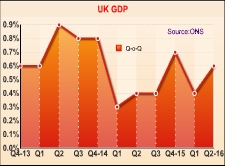
The U.K. economy logged faster growth in the second quarter as robust consumer spending and investment cushioned the region against the impact of the severe political and economic uncertainty in the run-up to the EU referendum.
Gross domestic product grew 0.6 percent sequentially after rising 0.4 percent in the first quarter. The growth figures matched the preliminary estimate published on July 27.
This was the 14th consecutive quarter of positive growth since the first three months of 2013.
On a yearly basis, GDP rose 2.2 percent in the second quarter, unrevised from the previous estimate. In the first quarter, the annual growth figure was 2 percent.
"Our survey returns, which include the period leading up to and immediately following the referendum, show no sign so far of uncertainty having significantly affected investment or GDP," ONS chief economist Joe Grice, said.
The Bank of England had projected little growth in the second half of the year. Growth was forecast to ease to 0.1 percent in the third quarter.
"While we still have serious concerns over the UK growth outlook, we are a little less pessimistic than we were in the immediate aftermath of the Brexit vote," IHS Global Insight economist Howard Archer said.
Archer believes that resilient consumer spending will keep the economy growing in the third quarter, but there is a very real risk that the economy will stagnate in the fourth quarter and could even contract marginally early in 2017.
On the production side, services output advanced 0.5 percent and industrial production gained 2.1 percent as previously estimated. Meanwhile, construction output dropped 0.7 percent instead of a 0.4 percent fall published previously.
The expenditure-side breakdown of GDP showed that household expenditure climbed 0.9 percent, the fastest since 2014, thanks to record high employment and low inflation. Meanwhile, government spending fell 0.2 percent.
Gross fixed capital formation increased 1.4 percent after easing 0.1 percent a quarter ago. At the same time, business investment rose 0.5 percent from the first quarter.
Including the alignment adjustment, the level of inventories increased by GBP 2.6 billion.
The trade balance deficit widened to GBP 15.7 billion from GBP 14.1 billion in the first three months of 2016. Exports and imports grew 0.1 percent and 1 percent, respectively.
Another report from ONS showed that the index of services climbed 2.4 percent in June from the previous year. The largest contribution to total growth came from business services and finance, which contributed 1.1 percentage points.
by RTT Staff Writer
For comments and feedback: editorial@rttnews.com
Business News

